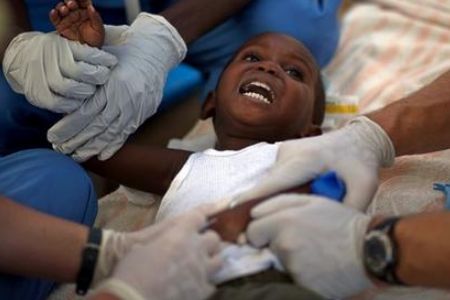
Audio clip: Adobe Flash Player (version 9 or above) is required to play this audio clip. Download the latest version here. you also need to have JavaScript enabled in your browser.
Anchor Lisa Mullins speaks with David Darg of the humanitarian group, Operation Blessing, about the reported outbreak of cholera in Haiti in a region north of Port-au-Prince. The outbreak has killed at least 140 people.Download MP3
Read the TranscriptThis text below is a phonetic transcript of a radio story broadcast by PRI’s THE WORLD. It has been created on deadline by a contractor for PRI. The transcript is included here to facilitate internet searches for audio content. please report any transcribing errors to . this transcript may not be in its final form, and it may be updated. please be aware that the authoritative record of material distributed by PRI’s THE WORLD is the program audio.
LISA MULLINS: I’m Lisa Mullins and this is The World, a co-production of the BBC World Service, PRI and WGBH in Boston. A confirmed outbreak of cholera in Haiti has authorities and aid workers there worried. The outbreak is in a rural region north of Port-au-Prince and it’s killed at least 140 people. The fear is that things could get a lot worse if the disease spreads to the crowded camps housing thousands of Haitians displaced by the earthquake in January. Water expert David Darg, of the humanitarian group Operation Blessing, has been working in Haiti since the quake. He’s just returned from his latest trip there.
DAVID DARG: just last night I left the hospital in the city of Saint-Marc and it was just a horrific scene. The hospital was inundated with patients clamoring at the gate to get in. The hospital is having to turn away people because they just couldn’t cope with so many people turning up at the gates. and it was just a very sad scene. People dying, people sick. and obviously very worrying for all of the relief groups and the medics on the ground.
MULLINS: David, is this throughout the major parts of Haiti or is this isolated right now in particular villages?
DARG: Well, it started in an isolated area, but the source of this disease, as far as we know, is the river, the Artibonite River, which runs through quite a vast expanse of the central plateau. So it could be affecting huge areas as far as we know now.
MULLINS: what do you yourself find as a water expert going through the area? what were you looking for?
DARG: Well, I’ve been in cholera regions before in India in 2007 following the floods in Bihar. I was in some really horrific cholera epidemic areas and the scenes I saw yesterday in Haiti were very similar. myself and all of the other NGO workers said this is cholera and we knew what it was and we knew what to do to tackle the problem.
MULLINS: how do you know what it was? how did you know? is it by the symptoms?
DARG: It’s the symptoms, yeah, and I don’t want to go into too much graphic detail, but there in the hospital in Saint-Marc you can almost instantly tell by looking at someone, just go by their symptoms, that it’s cholera.
MULLINS: how quickly do people pass away when they’re struck with cholera?
DARG: It can depend on how healthy they are to start with. in this region there’s high levels of malnutrition anyway. High levels of dehydration anyway and we heard of people dying as quickly as four hours after contracting it.
MULLINS: is there treatment available or anything that could save lives that’s there now?
DARG: Yeah, the thing with cholera is it is treatable. Once someone’s contracted the disease, if they’re given the correct treatments, if they’re rehydrated through intravenous drips, it’s very often that you can come through the disease.
MULLINS: and is that available or is it just a shortage of beds in hospitals right now?
DARG: Yesterday the hospitals were struggling to cope. I think today the situation’s becoming better for the victims and there’s definitely more doctors on the ground.
MULLINS: I thank you very much for talking with us. David Darg, a water expert for Operation Blessing who has just returned from Haiti where there’s a rising number of deaths from cholera. David, thank you.
DARG: Thank you very much.